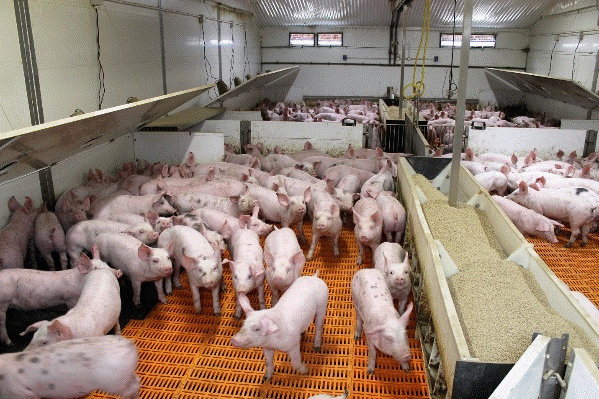With Nigeria’s population projected to grow from approximately 220 million in 2023 to an astonishing 377 million by 2050, the demand for protein-rich animal foods is set to surge dramatically. Yet, despite being one of the most versatile and profitable livestock, pig production remains vastly underexploited in Nigeria. Here’s why tapping into pig farming could be Nigeria’s hidden treasure in agribusiness.
Why Pig Farming is a Golden Opportunity in Nigeria
Globally, pork is the most consumed meat, surpassing beef and chicken, with over 110 million tons produced annually. In contrast, Africa accounts for less than 5% of this lucrative industry, indicating substantial room for growth. Nigeria ranks 21st globally in pig production, with a modest population of around seven to eight million pigs—mostly raised by smallholder farmers. Yet, the benefits of pig farming position it uniquely as an attractive venture for farmers and investors alike.
Why Pig Farming is a Smart Choice in Nigeria:
1. Rapid Breeding and High Productivity:
Pigs have a short generation interval, often reaching market weight (60-80kg) within 8-10 months, significantly faster than cattle or goats. This rapid turnover rate boosts productivity and profitability.
2. Versatile Feeding Options: Pigs thrive on a diverse diet, significantly reducing feeding costs. Farmers can utilize locally available byproducts like banana residues, maize residues, cassava peels, insect proteins, and brewery spent grain, which greatly reduces production costs.
3. Superior Meat Yield: Pig carcasses yield about 70% edible meat compared to 50-55% in cattle, sheep, and goats. Pork also contains less bone, making it more economical for processing and marketing.
4. Adaptability and Resilience: Pigs adapt well to various environmental conditions and farming systems. They thrive in both intensive and semi-intensive farming operations, making them suitable for diverse Nigerian agricultural conditions.
4. Multiple Income Streams: Beyond pork meat, pigs provide valuable byproducts such as lard (used by soap and pharmaceutical industries), skin for leather products, hair for brushes, and manure as nutrient-rich organic fertilizer.
Understanding Nigeria’s Pig Market Dynamics
Pig farming in Nigeria is predominantly concentrated in the southern regions, specifically Edo, Delta, Rivers, Cross River, and Akwa Ibom states, due to cultural acceptance and fewer religious restrictions on pork consumption. Other markets in the southeast and southwest regions, including Lagos, Enugu, and Akure, are expanding steadily.
Currently, about 95% of pigs raised are sold directly from farms to middlemen, highlighting untapped potential in direct marketing and value addition. Only a small fraction goes through formal processing and distribution channels, pointing towards significant investment opportunities in pork processing and marketing.
Key Challenges and Opportunities
Despite its potential, the Nigerian pig industry faces several challenges:
- Limited access to improved breeds: Farmers often struggle with inferior breeds leading to reduced productivity.
- High feed costs: Feed accounts for about 60% of production costs. Finding alternative feed resources is vital.
- African Swine Fever: Outbreaks periodically devastate herds, causing significant economic losses.
- Lack of modern processing facilities and abattoirs restricts market expansion and export potential.
Each challenge presents a distinct opportunity for investors and entrepreneurs to provide innovative solutions—like setting up modern feed mills, introducing improved pig breeds, and establishing processing plants for both domestic and export markets.
Maximizing the Pig Value Chain for Profitability
To fully harness pig production’s economic potential, Nigeria must strengthen the pig value chain. Key strategies include:
- Innovative Product Distribution: Expanding beyond farm-gate sales to supermarkets, retail stores, hotels, restaurants, caterers, and fast-food chains.
- Digital Market Integration: Creating robust e-commerce platforms to connect producers directly with consumers, improving profitability and convenience.
- Regional Export Opportunities: Expanding exports to neighboring ECOWAS countries such as Cameroon, Ghana, Benin, Togo, and Sierra Leone presents additional revenue streams, given the minimal competition in these markets.
Financial Viability and Growth Potential
Recent studies show pig farming as financially promising. Although initial investments may incur losses in the first two years, medium-scale pig farming ventures generally become profitable by the third year, with internal rates of return (IRR) between 17% (base scenario) and as high as 23% under optimal conditions.
Recommendations for Scaling Up Pig Farming in Nigeria:
To fully leverage Nigeria’s pig farming potential, the following steps are critical:
- Enhance farmers’ access to credit through favorable agricultural policies.
- Strengthen cooperatives among smallholder pig farmers to pool resources and increase bargaining power.
- Invest in local feed production by utilizing indigenous resources and reducing dependency on brewery waste.
- Provide targeted agricultural extension services to educate farmers on modern pig farming techniques and management practices.
- Encourage private sector investment in modern processing infrastructure and cold chain logistics for wider market distribution.
Final Thoughts:
The Nigerian pig farming sector holds immense promise as an untapped agribusiness opportunity. It offers a clear path toward enhancing food security, economic growth, and employment. With strategic investments, modern practices, and targeted support from both the public and private sectors, pig farming can undoubtedly transform into a profitable, sustainable industry in Nigeria.
Embracing this untapped resource today could significantly shape Nigeria’s agricultural landscape tomorrow—turning pigs into prosperity.


